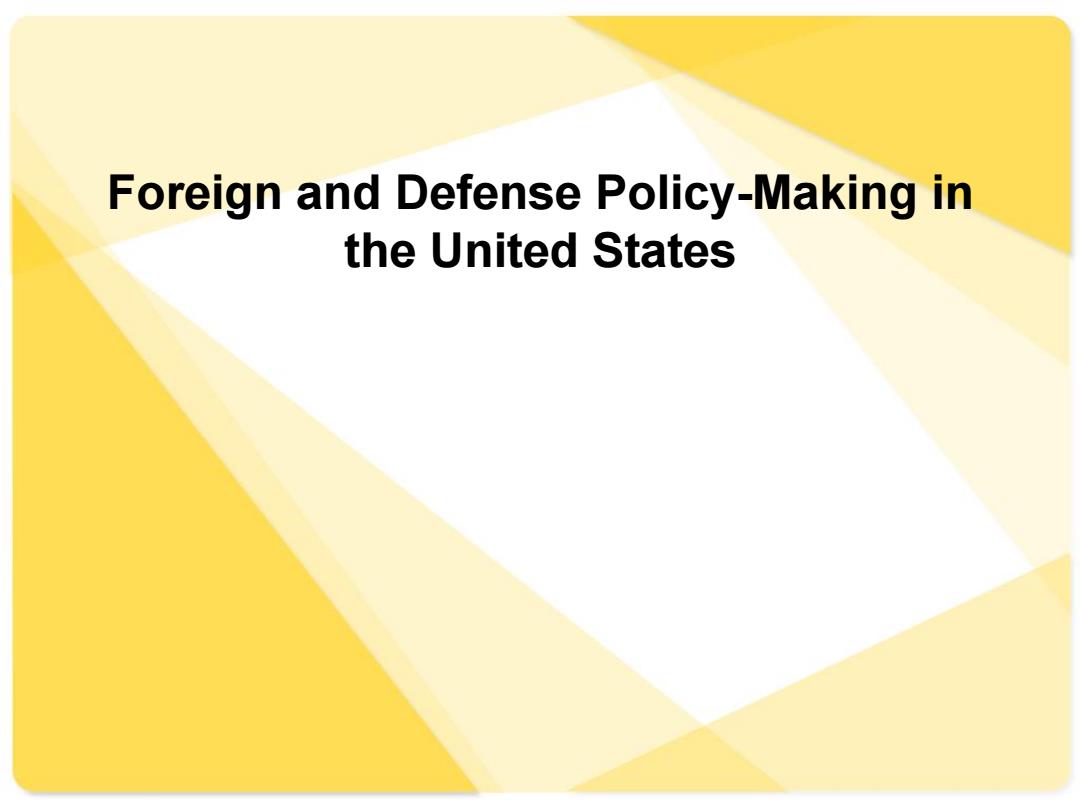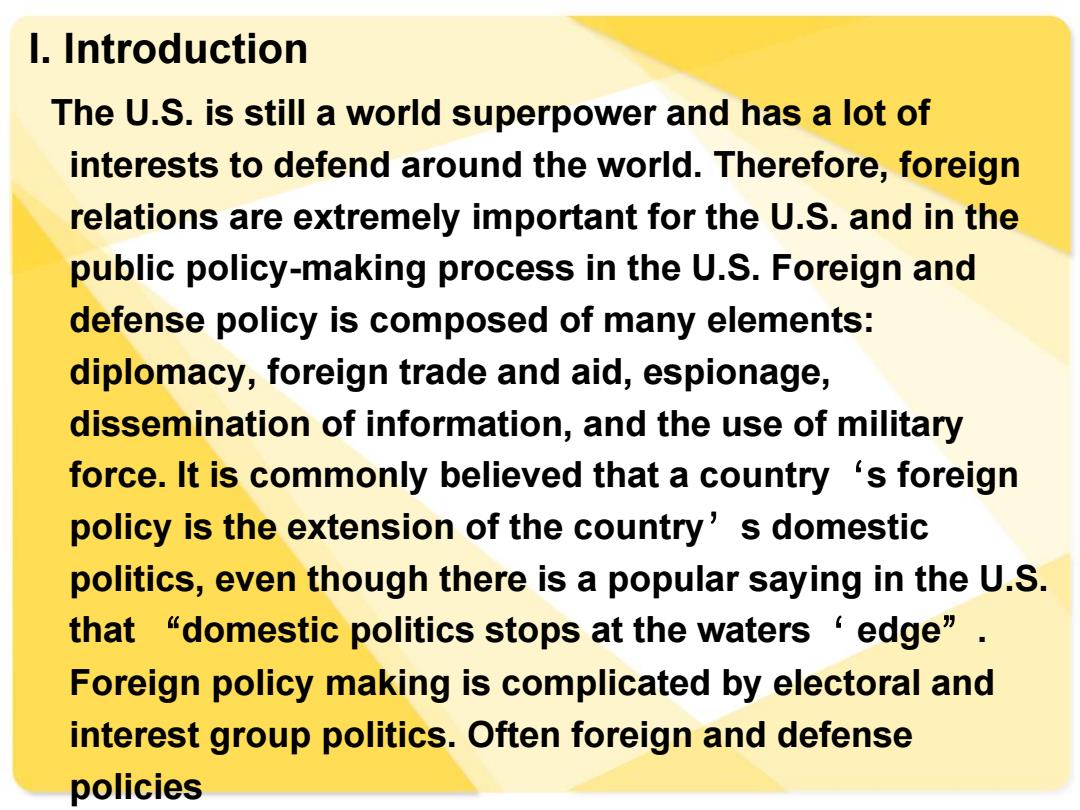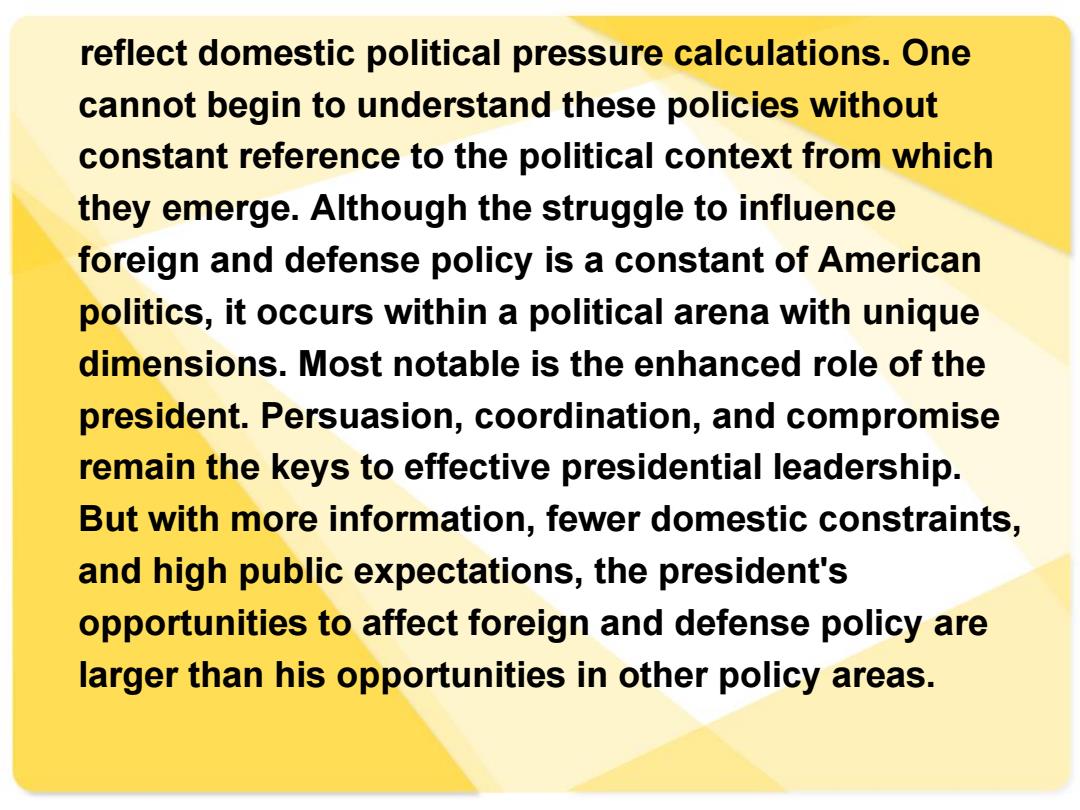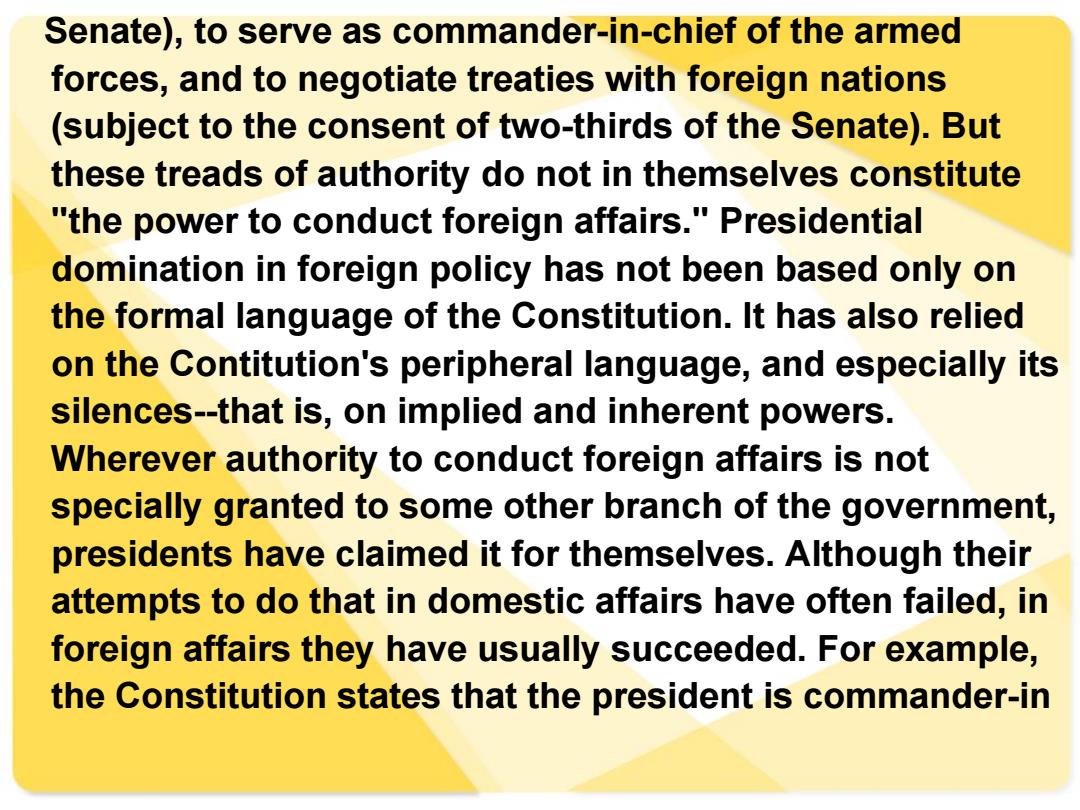
Foreign and Defense Policy-Making in the United States
Foreign and Defense Policy-Making in the United States

I.Introduction The U.S.is still a world superpower and has a lot of interests to defend around the world.Therefore,foreign relations are extremely important for the U.S.and in the public policy-making process in the U.S.Foreign and defense policy is composed of many elements: diplomacy,foreign trade and aid,espionage, dissemination of information,and the use of military force.It is commonly believed that a country 's foreign policy is the extension of the country's domestic politics,even though there is a popular saying in the U.S. that“domestic politics stops at the waters‘edge”. Foreign policy making is complicated by electoral and interest group politics.Often foreign and defense policies
I. Introduction The U.S. is still a world superpower and has a lot of interests to defend around the world. Therefore, foreign relations are extremely important for the U.S. and in the public policy-making process in the U.S. Foreign and defense policy is composed of many elements: diplomacy, foreign trade and aid, espionage, dissemination of information, and the use of military force. It is commonly believed that a country‘s foreign policy is the extension of the country’s domestic politics, even though there is a popular saying in the U.S. that “domestic politics stops at the waters‘ edge”. Foreign policy making is complicated by electoral and interest group politics. Often foreign and defense policies

reflect domestic political pressure calculations.One cannot begin to understand these policies without constant reference to the political context from which they emerge.Although the struggle to influence foreign and defense policy is a constant of American politics,it occurs within a political arena with unique dimensions.Most notable is the enhanced role of the president.Persuasion,coordination,and compromise remain the keys to effective presidential leadership. But with more information,fewer domestic constraints, and high public expectations,the president's opportunities to affect foreign and defense policy are larger than his opportunities in other policy areas
reflect domestic political pressure calculations. One cannot begin to understand these policies without constant reference to the political context from which they emerge. Although the struggle to influence foreign and defense policy is a constant of American politics, it occurs within a political arena with unique dimensions. Most notable is the enhanced role of the president. Persuasion, coordination, and compromise remain the keys to effective presidential leadership. But with more information, fewer domestic constraints, and high public expectations, the president's opportunities to affect foreign and defense policy are larger than his opportunities in other policy areas

Il.Foreign and Defense Policy Makers 1.The president Throughout the American history,the president has been the dominant participant in foreign policy making. Although presidential authority in this area is not unlimited,the American political system has afforded great advantage to presidents in their efforts to shape foreign and defense policy. Little in the language of the Constitution suggests that the framers intended the executive to dominate foreign policy.In fact,the Constitution is relatively silent on foreign policy.It gives the president the authority to receive foreign ambassadors,to appoint American ambassadors,(with the advice and consent of the
II. Foreign and Defense Policy Makers 1. The president Throughout the American history, the president has been the dominant participant in foreign policy making. Although presidential authority in this area is not unlimited, the American political system has afforded great advantage to presidents in their efforts to shape foreign and defense policy. Little in the language of the Constitution suggests that the framers intended the executive to dominate foreign policy. In fact, the Constitution is relatively silent on foreign policy. It gives the president the authority to receive foreign ambassadors, to appoint American ambassadors, (with the advice and consent of the

Senate),to serve as commander-in-chief of the armed forces,and to negotiate treaties with foreign nations (subject to the consent of two-thirds of the Senate).But these treads of authority do not in themselves constitute "the power to conduct foreign affairs."Presidential domination in foreign policy has not been based only on the formal language of the Constitution.It has also relied on the Contitution's peripheral language,and especially its silences--that is,on implied and inherent powers. Wherever authority to conduct foreign affairs is not specially granted to some other branch of the government, presidents have claimed it for themselves.Although their attempts to do that in domestic affairs have often failed,in foreign affairs they have usually succeeded.For example, the Constitution states that the president is commander-in
Senate), to serve as commander-in-chief of the armed forces, and to negotiate treaties with foreign nations (subject to the consent of two-thirds of the Senate). But these treads of authority do not in themselves constitute "the power to conduct foreign affairs." Presidential domination in foreign policy has not been based only on the formal language of the Constitution. It has also relied on the Contitution's peripheral language, and especially its silences--that is, on implied and inherent powers. Wherever authority to conduct foreign affairs is not specially granted to some other branch of the government, presidents have claimed it for themselves. Although their attempts to do that in domestic affairs have often failed, in foreign affairs they have usually succeeded. For example, the Constitution states that the president is commander-in